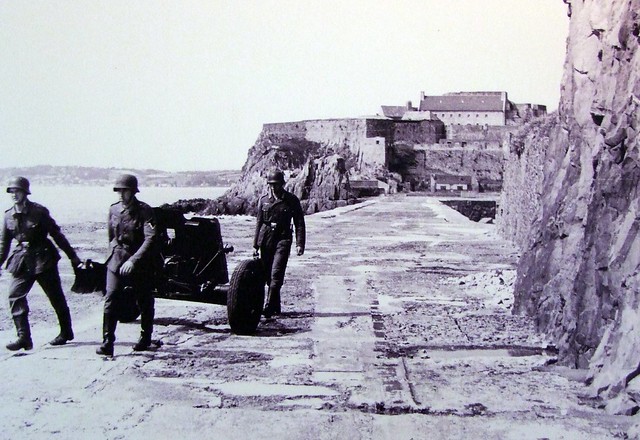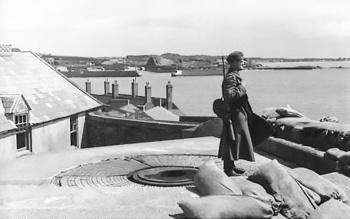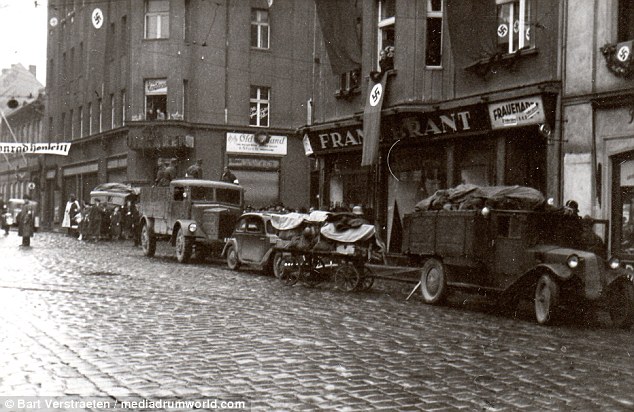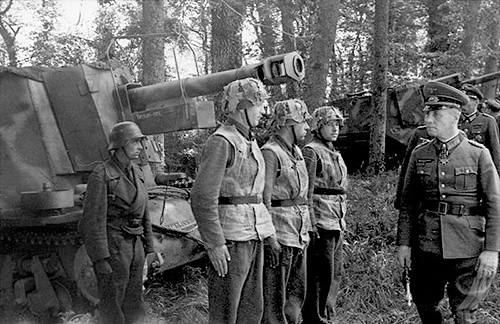The German occupation of the Jersey Channel Islands lasted pretty much the whole of WW2 from the 30th June to its liberation day which is celebrated as a bank holiday now on the 9th of May.
The German Occupation of Jersey began one week after the British government had demilitarized the island fearing for the safety of civilians should there be any conflict. The code name for this was “Operation Green Arrow” and the initial German Air Force reconnaissance flights mistake civilian farming lorries for troop carriers. On the 28th of June , the German Air Force, not knowing of the demilitarization, bomb and machine gun multiple sites on the island. The attacks killed ten people and wound many more. A few days later on the 1 of July 1940 General Richthofen, the Commander of the German Air Forces in Normandy, dropped an ultimatum from the air demanding the immediate surrender of the island. White flags and crosses were placed in prominent positions, as stipulated by the Germans, and later that day Jersey was occupied by air-borne troops under the command of Hauptmann Gussek.

Under the occupying forces, one of the greatest hardships was the lack of news from the mainland after the Germans had outlawed the use of radio sets. A number of individuals risked imprisonment by making their own sets and spreading frontline news. Horse drawn traffic became an increasingly regular mode of transport as petrol shortages became likely, and many vehicles were converted to use gas. The price of other transport rose, for instance bicycles became more expensive to buy, therefore the islanders became more restricted in terms of what they could and could not do. The German’s ordered all traffic to drive on the wrong side of the road. The island was also moved to Central European time. In the months following D-Day, as the Allies regained control of France, the source of supplies fueling the islands was now no longer available.
Jersey became very isolated in the sense that shortages were hitting home, including not enough food and water to supply all islanders. This led to developments between the government and the Red Cross to send parcels of food. During autumn of 1944, fuel supplies were slim to none, electricity was on the grips of working leaving islanders desperate. It did not help the fact that medical supplies were also practically non- existent which therefore meant spreading of diseases rapidly. Never the less, The Red Cross Ship SS Vega arrived on the 30th of December to relive all those starving and dying islanders bringing them clothes, food, water and medical attention.
Hitler ordered the conversion of Jersey into an impregnable fortress. Thousands of slave workers from countries like Russia, Spain, France, Poland, and Algeria built hundreds of bunkers, anti-tank walls, railway systems, as well as many tunnel complexes. In late 1943 the Tunnel Complex Ho which to us is known as the Jersey War Tunnels in St. Lawrence was converted from an artillery workshop and barracks to an emergency casualty clearing station able to cope with up to 500 patients. All of the fortifications built around the island were part of Hitler’s “Atlantic Wall”. Today, traces of Jersey’s defenses and wartime occupations can be discovered across the island, especially in St. Ouen’s Bay.
By 7 May 1945, the German army had surrendered and the end of the war in Europe was announced. During the week leading up to 6 May islanders had been hearing reports of Hitler’s fall in Berlin by way of their hidden radios. In spite of the fact that the island was still officially under occupation, rumors began circulating of an imminent end to the war in Europe. However beforehand, on the 3rd of May a British Military operation ‘Nestegg’, with the objective of liberating the Channel Islands, was set in motion when a coordinated group of British Army units, collectively known as ‘Force 135’. Together with the units of Force 135, this first party consisted of a team of officials responsible for negotiating the terms of the Germans’ surrender. The front page of the Jersey Evening Post carried Jersey’s first confirmation of the Allies’ victory in Europe, and islanders were informed that Winston Churchill would broadcast the Nation’s first official announcement that afternoon at 3.00pm. Crowds began to gather at various locations to hear the announcement that would declare their liberation. Islanders waited patiently amidst the heavy air of expectation.
Below are some pictures taken from google images of Jersey during the times of the occupation-





